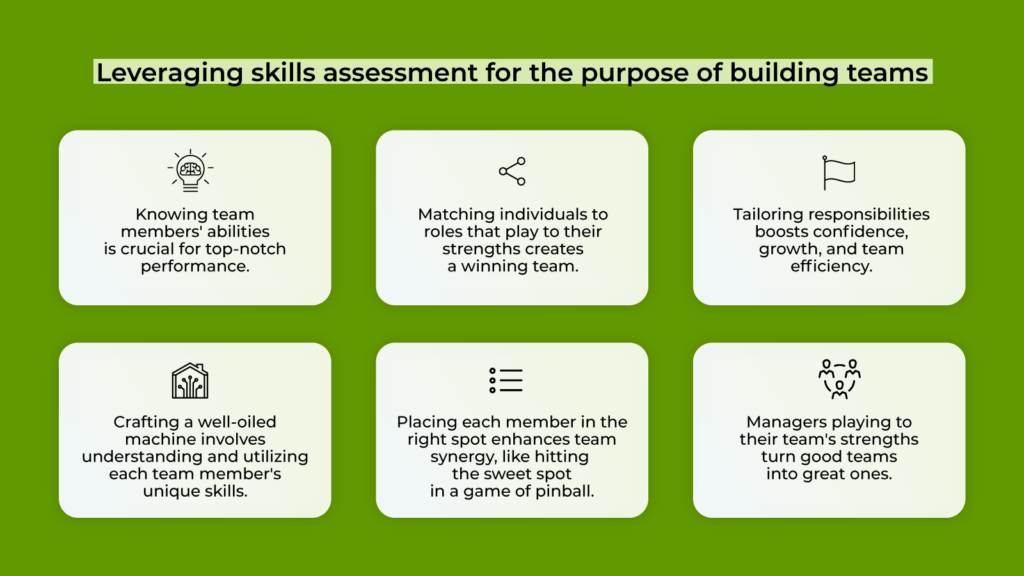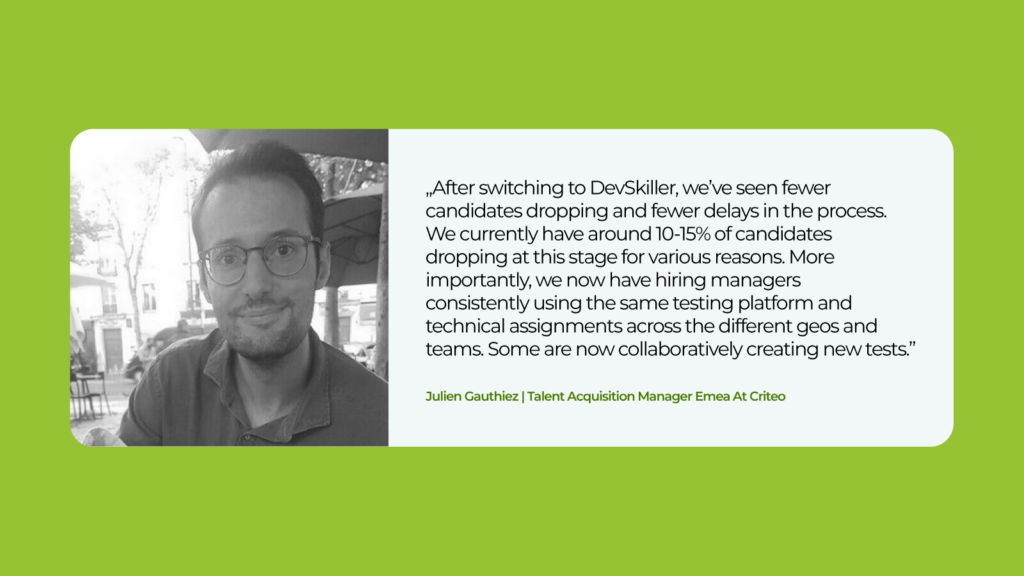
Why skills assessment is a gateway to organizational success

Have you ever wondered how to truly gauge your abilities and identify areas for improvement? Or perhaps you’re responsible for managing a team and need a reliable method to pinpoint hidden talents and optimize performance. That’s where skill assessments come into play. This comprehensive guide will equip you with the knowledge and tools necessary to navigate the world of skill assessments effectively. Let’s dive in!
Introduction to skills assessment
Definition and importance workforce
In today’s rapidly evolving job market, a clear understanding of one’s skills is paramount. But what exactly are skill assessments? Essentially, they are tools designed to objectively measure an individual’s abilities in specific areas. These assessments can take various forms, from traditional pen-and-paper tests to interactive simulations and even gamified platforms.
But why are skill assessments so crucial in today’s workforce?
- For individuals: Skill assessments provide invaluable self-awareness. They empower you to identify your strengths, pinpoint areas for improvement, and make informed decisions regarding your career path. Whether you’re looking to upskill, reskill, or simply gain a competitive edge, understanding your capabilities is key.
- For employers: In today’s competitive landscape, organizations need a reliable way to identify top talent. Skill assessments offer a standardized and objective method for evaluating candidates. This ensures a better fit for the role, reduces employee turnover, and ultimately contributes to a more productive and engaged workforce.
Brief overview of how skills assessments are changing careers
The impact of skill assessments extends far beyond simply matching individuals with jobs. They are fundamentally reshaping the entire career landscape in several ways:
- Shifting from credentials to capabilities: Traditional hiring practices often placed a heavy emphasis on academic credentials. Skill assessments, however, allow individuals to demonstrate their actual abilities, regardless of their background or formal qualifications. This opens up opportunities for a wider pool of talent and fosters a more inclusive job market.
- Driving continuous learning and development: The insights gained from skill assessments empower individuals to take control of their professional development. By identifying specific areas for improvement, individuals can pursue targeted training programs and acquire the skills needed to thrive in their chosen fields.
- Enabling data-driven talent management: For organizations, skill assessments provide a wealth of data that can inform talent management strategies. This data can be used to identify high-potential employees, personalize development plans, and even forecast future workforce needs.

Why organizations implement skills assessments
Organizations implement skill assessments for various reasons, and the benefits impact both companies and their employees. Let’s explore some key motivations behind adopting skill assessments:
For hiring: Ensuring candidate fit and skill matching
Skill assessments play a crucial role in evaluating candidates effectively. By going beyond resumes and cover letters, these assessments provide objective insights into a candidate’s abilities. This allows recruiters to determine if those abilities align with the specific requirements of the job.
Instead of relying solely on self-reported experience, recruiters can leverage skill assessments to evaluate a candidate’s practical knowledge and how they would perform in real-world scenarios. This approach reduces the risk of bad hires and increases the likelihood of finding individuals who possess the exact skills needed for the position.
For current employees: Identifying training needs and career development opportunities
Skill assessments are equally valuable for existing employees, offering valuable insights into their strengths and areas for improvement. By identifying skill gaps, organizations can develop targeted training programs that address those specific needs, resulting in a more skilled and adaptable workforce.
Furthermore, skill assessments can guide career development initiatives. Employees gain a clearer understanding of their strengths and weaknesses, empowering them to make informed decisions about their career paths. This personalized approach fosters employee growth and satisfaction within the organization.
The role of skills assessments in enhancing team performance and company growth
Ultimately, the implementation of skill assessments contributes to enhanced team performance and overall company growth. By ensuring that employees possess the necessary skills and knowledge, organizations can improve productivity, efficiency, and innovation.
Skill assessments can also reveal hidden talents within teams, allowing managers to optimize team composition and leverage individual strengths effectively. Moreover, a culture that values continuous learning and development can lead to increased employee engagement, motivation, and retention, fostering a positive work environment.
Case study: Skills assessment in action
Criteo, an established leader in commerce marketing, has greatly enhanced its recruitment process by incorporating DevSkiller.
This case study explores how Criteo, with over 2,800 employees and 31 global offices, streamlined its technical hiring practice to support its annual recruitment of 100 technical professionals, including solutions engineers, data analysts, and front-end developers.
Previously, Criteo’s approach to screening technical job candidates involved at-home case studies as preliminary filters, which proved inefficient due to a lack of tracking and insight into candidate performance and often led to delays and inconsistent procedures across its various locations.
To address these challenges, in 2017, Criteo introduced DevSkiller, transforming their technical recruitment strategy. Julien Gauthiez, Talent Acquisition Manager EMEA at Criteo, notes significant time savings of 2-4 days per hire and improved conversion rates between interviews, with a more consistent and standardized skills assessment test and process.
This has not only alleviated the pressure on their Operations and HR departments but also increased productivity and resulted in cost savings.

The new streamlined recruitment process at Criteo now begins with a phone screening conducted by a recruiter, followed by a DevSkiller test serving as a technical interview, and concludes with standard interviews with hiring managers and stakeholders.
This method has been lauded for its consistency, reduced number of interviews without compromising hiring rates, and a candidate-friendly experience that allows applicants to engage with the test at their convenience and monitor their progress.
The switch to DevSkiller has resulted in a candidate drop-off rate of approximately 10-15% at the testing stage for various reasons. Importantly, hiring managers now consistently employ the same platform and technical assignments across different geographies and teams, with some even collaborating to create new tests.
This case study underscores Criteo’s commitment to improving the hiring experience for candidates, employers and hiring teams alike through innovative technical screening solutions.
International standards for skills assessment
Sticking to world-class best practices and ISO standards is like having a seal of approval on your assessment process.
It’s a guarantee that you’re not cutting corners and that you’re serious about the quality and impact of how you assess and evaluate skills.
When you follow these guidelines, you’re showing that your methods are up to par with the highest international benchmarks.
It’s a promise of consistency, reliability, and trustworthiness in your assessments, which means a lot to everyone involved – from the top brass to the newest recruits. It’s the gold standard that ensures you’re not just doing things right, but you’re doing the right things for effectiveness and fairness.
Preparing for the future: The next generation of skills assessment
The workforce is constantly changing, and our ways of assessing skills need to keep pace. To stay ahead, it’s crucial to predict which skills will be in demand in the future and to update our skills assessment tests and methods to match.

This forward-thinking approach ensures that we’re not just keeping up, but we’re setting the pace, ready to welcome new trends and technologies with the right talent in hand. It’s all about being proactive rather than reactive, preparing ourselves and our workforce for whatever comes next on the horizon.
Conclusion: The way forward with skills assessment
In the end, the goal of skills assessment is to pave the way for individual and organizational growth. By continuously refining this process, we ensure that the workforce remains agile and prepared for the challenges of tomorrow.
FAQ
- What’s the most effective way to conduct a skills assessment?
The most effective way to conduct a skills assessment is to use a combination of methods tailored to the individual or the job role. This for assessment tests often includes a mix of self-assessments, practical examinations, peer reviews, and standardized tests. Utilizing technology like AI-driven platforms can also enhance the process by providing a more detailed analysis of skills and performance.
- How often should skills assessments be conducted?
Skills assessments should ideally be an ongoing process, but a formal assessment is recommended at least once a year. This frequency ensures that employees’ skills remain current and aligned with their career progression and organizational changes. It also allows for timely identification of any skill gaps that may need to be addressed through training or professional development.
- Can skills assessments be tailored to specific industries?
Yes, skills assessments can and should be tailored to specific industries. Each industry has unique skill requirements, and a relevant skill assessment therefore should reflect the specific competencies and technical knowledge pertinent to that field. Customizing assessments helps ensure that they are valid and reliable indicators of an individual’s ability to perform in a particular industry context.
- What are some common mistakes to avoid during skills assessments?
Common mistakes to avoid during skills assessments include not clearly defining the skills being assessed, failing to provide a standardized assessment environment, and not taking into account the test-taker’s personal learning and communication styles. Additionally, relying solely on one type of assessment, such as only written tests for practical skills, can lead to an incomplete picture of an individual’s capabilities.
- How can organizations ensure the fairness of skills assessments?
Organizations can ensure the fairness of skills assessments by developing clear, objective criteria and ensuring that the same conditions are applied to all participants. They should be aware of and mitigate unconscious biases, and consider cultural and language differences among participants. Utilizing blind assessments, or personality tests where the evaluator is not aware of the candidate’s identity, can also help reduce bias. It’s essential to continuously review and update assessment methods to maintain their relevance and fairness.
DevSkiller has all of your technical skills assessments needs covered.




